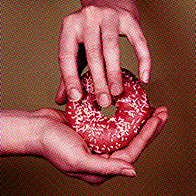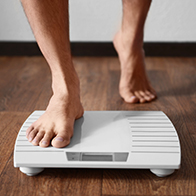Diabetic Neuropathy Is Very Real—And It Will Come for Your Penis

For men with certain health problems, it can be hard out there—especially when it comes to getting an erection.
As men age, they deal with a mounting array of health challenges that can affect sexual function, such as an increased risk for conditions including high blood pressure, weight gain, lower testosterone and heart issues.
There's one especially pernicious health risk men face—and they don't even have to be among the older set: diabetes. It's a group of diseases that can sneak up on people and have profound and lasting effects on their erectile function before they even know what's happening.
One particularly nasty aspect of diabetes is called diabetic neuropathy, or nerve damage caused by diabetes, and it can absolutely affect a person's ability to get an erection.
Diabetes, the penile arousal killer
Diabetes has been diagnosed in an estimated 26.9 million people in the United States, or around 8.2 percent of the population, according to the National Institute of Diabetes and Digestive and Kidney Diseases.
As if that weren't bad enough, an estimated 7.3 million Americans older than 18 have diabetes but haven't been diagnosed, which means more than 21 percent of adults who have diabetes don't know they have it.
This is very bad news for men with diabetes—and their sex lives.
Over time, sustained high blood sugar, or glucose, causes damage to the nerves in the extremities. If you've heard of someone losing a foot due to diabetes, it likely had to do with diabetic neuropathy. A part of this process is called demyelination, or the loss of a fatty tissue called myelin that protects the nerves.
'Autonomic neuropathy or diabetic neuropathy—the demyelination of the peripheral nerves to the penis—is a very common cause of ED in diabetics.'
As the nerve damage reduces sensation, especially at the ends of the longer nerves like those in the feet, any small blister or cut may go unnoticed for a long time, resulting in infections that go untreated. Not only that, diabetes also affects blood flow, making it more difficult for the body to heal itself and causing gangrene to develop. This sometimes results in amputation.
That's not to say having high blood sugar means your penis is in danger of becoming gangrenous and needing to be amputated. However, diabetic neuropathy can have a profoundly negative effect on how well your member works.
"Autonomic neuropathy or diabetic neuropathy—the demyelination of the peripheral nerves to the penis—is a very common cause of ED in diabetics," said Neel Parekh, M.D., a urologist and men's fertility specialist affiliated with the Cleveland Clinic. "The nerve damage prevents the smooth muscle in the penis from relaxing, and so the penis can't fill with blood."
Diagnosing diabetic neuropathy
Exercising regularly and eating a healthy diet are vital to the prevention of developing diabetes in the first place. But once diabetes is diagnosed, eating right, monitoring blood sugar and getting tested regularly are crucial to mitigating the condition's worst effects, including neuropathy.
It's important to remember that as sensitive as the nerves in human fingers are, the nerves in the penis are even more delicate. It's fair to consider diabetes and diabetic neuropathy as the ultimate "mess around and find out" condition: For people who have diabetes and don't take care of themselves, the nerve damage to their penis is likely done before they recognize any other signs.
"I see a lot of guys come in with high A1C, which is a measure of their previous three months' glucose levels," Parekh said. "If they're high, that's obviously a negative sign. So I'm going to assume their erections are being affected negatively by their poorly controlled diabetes."
During office visits, Parekh sometimes issues a wake-up call regarding nerve damage for men with diabetes who still have high blood sugar.
"I'll ask them if they have any neuropathy in their fingers or toes," he said. "If they get some tingling or numbness in their fingers or toes, I'll tell them that the fact that you already have that likely indicates that your penis has already been affected, as well, since the nerves to the penis are smaller than the nerves to the fingers and toes."
Good news, bad news
The bad news is diabetic neuropathy is very common: As many as 50 percent of people with diabetes develop the condition, according to the Mayo Clinic. For people with a penis, the news may be even grimmer.
"Unfortunately, most men with diabetes will get ED," said William Brant, M.D., chief of urology at the Salt Lake City Veterans Affairs Medical Center. "But it depends on many factors. These include how well or how poorly the diabetes has been controlled, and whether there are other issues—e.g., with eyes, kidneys [or other] neuropathies."
Want more bad news? Nerve damage of this sort isn't typically reversible.
The takeaway is that with proper blood sugar management and other healthy lifestyle choices, you can arrest the progress of diabetic neuropathy—or prevent diabetes from developing in the first place.
If you want to avoid the worst scenarios, start by reducing your sugar intake and exercising more today.
"Typically, the nerve damage is irreversible," Parekh said. "At that point, to prevent things from progressing even more to where they would require a penile implant, the sooner they reverse course [on blood sugar], the better."




















